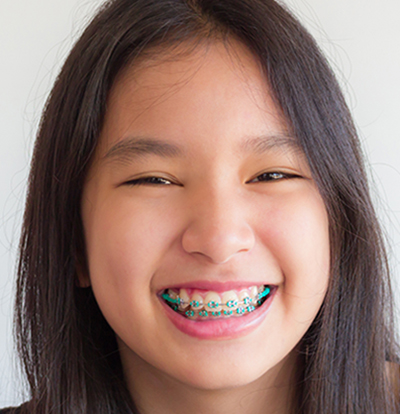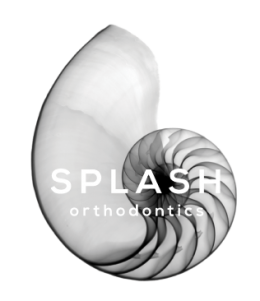Splash Orthodontics
What is the Best Age for Braces?

 What is the ‘Best Age’ for Braces?
What is the ‘Best Age’ for Braces?
You, along with the vast majority of society, may believe that the best age for braces is in your early teens. When we think of braces and who wears them, everyone usually pictures a young teenage boy or girl. This is because many assume braces are fitted at an early age to help promote healthy oral development. Today, however, it’s not uncommon to notice adults wearing braces.
So, why is this? Is it better to have braces early? What are the reasons for this? Is there a point where you’re no longer applicable for braces? And above all, what is the best age to have braces? Well, we’re about to answer all those questions!
Looking at Age in Relation to Braces
Let’s start with children. It’s common to see children wearing braces, more so than adults. Why is this? Because when we’re young, our mouths are continuously changing. We lose teeth, we grow teeth, but somewhere along the way, we may require dental intervention to help promote a healthy mouth development.
While there is no specific age a child should pay their first visit to a dentist or orthodontist, it’s encouraged when their permanent teeth start to appear. In most cases, this is between the ages of 7-10.
There are of course, exceptions to this ‘rule’. For example, if you feel as though your child is having difficulty eating or you notice there is a clear problem with their mouth, gums or teeth which is affecting them, a visit to the orthodontist may be required. In most cases, your dentist will refer your child to an orthodontist, so it’s important to visit the dentist at least once a year to ensure their oral health is in check.
Is there an Age Limit for Braces?
You’ll be glad to know there is no age limit to having braces! In fact, many adults visit the orthodontist to have their teeth correctly aligned. This is either because they neglected to see an orthodontist, or they were not able to arrange a visit during their childhood.
It’s not uncommon for an orthodontist to suggest that there is in fact a better age to seek orthodontic treatment. However, this does not mean that the effects of having treatment later in life will hamper the development or the results of undergoing treatment. It’s simply a case of addressing the issue before it worsens – to ensure the patient wouldn’t be living in discomfort.
Are there Major Differences Regarding Braces for Kids and for Adults?
Strictly speaking there are no major notable differences between adult braces and braces for children. This is because all braces are unique anyway, so no patient will ever have ‘the same braces’. Of course, there are different types of braces: Invisalign, lingual braces, metal (wired) and retainers etc but the technique (or, application) remains very similar for evert patient.
The Psychology Behind Braces
While there are not notable differences regarding the application of braces, there are psychological implications worth considering. For example, having braces as a child can be both exciting and a bit scary, depending on how your child reacts to the news! Some children are anxious about the idea of braces and may even be nervous about visiting the dentist, whereas others may believe that getting braces is a ‘transformational’ period of their lives.
Teenagers present more difficulties, as they’re more conscious of their image. While they are aware that the application of braces will transform their smile in the long-run, the thought of living with braces isn’t easy to digest, at least for some. This is why Invisalign is becoming an increasingly popular option for teenagers. Being translucent, they present a subtle alternative to braces, making the thought of having braces more appealing.
However, your orthodontist will ultimately decide the most appropriate treatment.
The Cost of Braces in Relation to Age
Due to the fact braces are priced on how many adjustments are needed, there’s no fixed price. It also depends on how long the braces need to be worn and how many adjustments are required during this time.
However, in most cases, braces for adults may cost slightly more because they take longer to have an effect. This is because adults’ mouths are more susceptible to gum disease, weakened roots and other factors that simply come with age. Whereas children’s teeth are able to be shifted into desired positions far easier because they’re still developing. This means braces take less time to work.
Again, the condition of your mouth depends on the price of your braces. However, in most cases, braces for adults do cost more. You can always speak with your orthodontist to get an idea of how much your braces will cost.
Beginning the Braces Journey
You can get braces during any stage of your life but it’s important to do your own research before opting to visit your orthodontist. Find out which option you’d prefer and then arrange a consultation with your orthodontist. They will perform some standard checks such as taking x-rays of your mouth and bite.
Arranging a consultation with your orthodontist is just the start of your journey towards a brighter smile and a healthier you. All orthodontists understand that getting braces is a big commitment for some, that’s why it’s important to raise any questions or concerns you may have during your consultation. However, you can rest assured that once your braces are fitted, your orthodontist will be there to answer any questions throughout your treatment process and thereon after.

 Hove
Hove 01273 203514
01273 203514


 Read more
Read more


